We’re all just passing through. Everything fades, evaporates, decays, falls apart. All the more reason to cherish serenity when it happens to find you or you it, which doesn’t happen all that often. Screenwriter Melissa Mathison, who passed Wednesday in Los Angeles at age 65, had a hand in making a few movie moments seem somewhat magical. Like E.T., The Extra Terrestrial, which she wrote. I’ll never forget how I felt after my first press screening of that film in the spring of ’82, a few weeks before it opened and the mass audience got hold of it and turned it into something I’d rather not think about. The light was upon Mathison back then; she got married to Harrison Ford the following year (’83), and they wound up having two sons. She also wrote The Black Stallion, The Escape Artist and the forthcoming The BFG. Nothing lasts, everyone dies…but life never stops happening. Sorry but this is what hit me just after I read the story.
Day: November 4, 2015
All Bond Films Are Vaguely Numbing…What?
The virulent pan of Spectre (MGM/Columbia, 11.6) by Forbes‘ Scott Mendelson is almost…touching? Mendelson is really, really disappointed in this thing — “the worst 007 film in 30 years,” he claims, or since, like, A View to a Kill or whatever. This indicates, obviously, that Mendelson doesn’t go to Bond films for a nice wank-off, like most of us probably do. He apparently believes that Bond films have the potential to redeem and cleanse and change our lives…okay, his life for the better. Skyfall came a lot closer to this, he contends, and…uhm, Casino Royale and Quantum of Solace were relatively decent? Something like that.
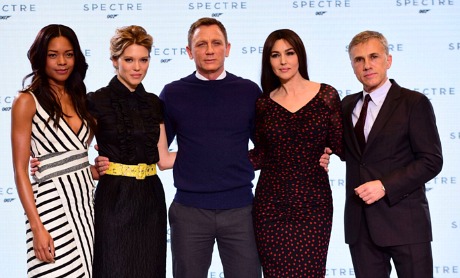
Let me tell ya somethin’, fella. I sat through Skyfall and Spectre with the exact same sense of slumbering, half-narcotized amusement. No better, no worse…flatline. I don’t go to Bond films for any kind of fucking deliverance. Nobody except guys like Mendelson do that. I go to fucking Bond films because I’ve been invited to the fucking all-media screenings and…you know, I need to watch and take mental notes and review and whatever the fuck, keep up with the other blogaroonies. It goes no deeper than that.
I give as much of a fuck about this franchise as Daniel Craig does. Okay, probably less because Craig’s getting handsomely paid and I’m getting…what am I getting out of watching these things? Mild diversion, mild stimulation, mild amusement…all is mild, all is faint boredom, all is theatre-seat sprawl and the usual submission to corporatism. My popcorn bucket was accidentally kicked over by some shuffling older guy on his way to the bathroom and I didn’t even care. I just looked down and saw the popcorn all over the rug and said to myself, “Oh…okay, whatever.” And then I looked back at the screen and something else was happening that I didn’t care much about.
By The Sea: Brad, Angie, Marcheline & Jon
Angelina Jolie recently said that By The Sea (Universal, 11.15) is the “first film completely based on my own crazy mind.” She said in the same article that the drama, set in the ’70s, is “not autobiographical” — i.e., not based on anything she and husband Brad Pitt have gone through. But it does seem to have been “drawn loosely” from a marital trauma suffered by Jolie’s late mother, Marcheline Bertrand, who died in January 2007 from ovarian cancer. It happened when husband Jon Voight catted around in 1976, when Angelina was barely a year old. Andrew Morton’s unauthorized biography of Jolie reports that Voight had an affair with actress Stacey Pickren, who played Ophelia to his Hamlet during a production of Shakespeare’s classic at the University of California in Northridge, where Voight was an artist-in-residence. Bertrand filed for divorce in 1978; it was finalized in ’80. My understanding of By The Sea‘s basic plot is that the marriage between Brad and Angie’s couple is coming apart due an incident of infidelity on Brad’s part. So basically Brad is more or less playing Jon Voight and Angie is more or less playing her mom. Not precisely but close enough. It all fits together. [Tip of the hat to Sasha Stone, who shared this view a couple of hours ago.]
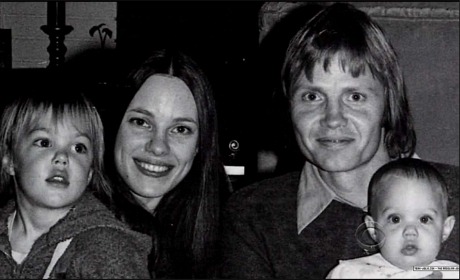
Speaking to Vanity Fair‘s Julie Miller about By The Sea, Jolie said that “I know some people are going to hate it [and] some are going to like it. But it was important to me to feel like an artist again.”
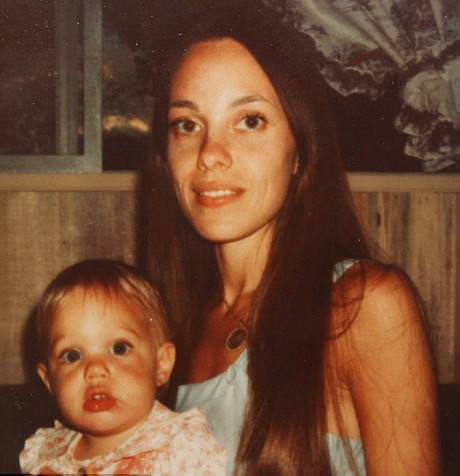
The Real Spotlight Hero? A 40ish Bearded Guy Who’s Even More Soft-Spoken Than Michael Corleone
“If Spotlight feels dogged in its procedure, then why does it exert such command? Because, I think, [director Tom] McCarthy is tackling something more basic than paranoia — namely, pride of place, and the way in which it offers both an embrace and a choke hold. ‘Born and raised,’ Walter Robinson says, when asked if he’s from Boston, and the same rings true, throughout the film, for the hunter and the hunted: for the Spotlight squad, for the fund-raisers at a charity gala, and for the authorities at Robinson’s old high school (across the street from the Globe), who harbored an abusive cleric in their midst. And what of the paper’s subscribers, who are fifty-three per cent Catholic? Will they be willing to read of rot in the foundations?
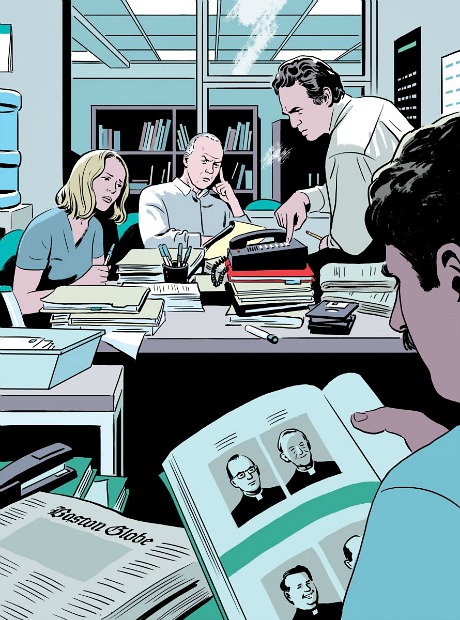
“Paul Guilfoyle has a wonderful turn as a Bostonian grandee, confident that any unpleasantness can be smoothed away with a hand on the shoulder and a quiet drink. He’s not a monster, or a hypocrite; he’s a decent sort, oiling the wheels of society. To stop them turning, in the interests of justice, takes not only guts but imagination.
“That is why Marty Baron, of all people — shy, taut, and humorless, in Liev Schreiber’s clever portrayal — struck me as the hero of the hour. He is mocked for being, as one insider labels him, ‘an unmarried man of the Jewish faith who hates baseball,’ but it is precisely his status as an outsider that allows him to initiate the quest. Folks in the Church, and elsewhere in the city, know what went on, yet they don’t really want to know. It’s all too close to home. Baron wants to know.” — from an 11.9 review by New Yorker critic Anthony Lane.
In 234 Words, Why Saoirse Ronan Deserves Best Actress Nomination
From A.O. Scott‘s 11.3 N.Y. Times review of John Crowley & Nick Hornby‘s Brooklyn: “When a family emergency summons Eilis back to Ireland, Brooklyn discovers its plot and reveals the stakes of its heroine’s story. And heroic she is, even though her drama is firmly anchored in the mundane. At home, she finds familiar comforts and also a new suitor, a local boy grown into handsome Domhnall Gleeson.
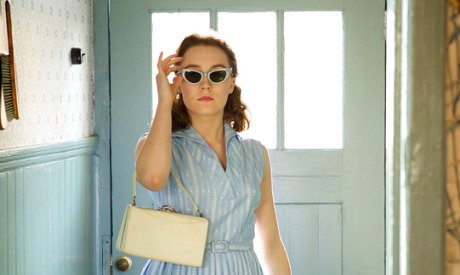
“Eilis’s romantic predicament is agonizing, for her and also for the viewer. I can’t remember the last time I cared so much about the marital prospects of a fictional character, and I don’t think that’s just because it’s in my nature to root for a guy named Tony against a skinny redhead.
“The real reason is Ms. Ronan, who has grown from an uncannily intelligent child actor into a screen performer of remarkable force and sensitivity. On the page, Eilis comes alive through the fineness of Mr. Toibin’s prose. A devotee of Henry James, he registers the fluctuations of the character’s inner weather with meteorological precision. Inwardness is a great challenge for filmmakers. The human face is a wall as well as a window. Words lose their power. Everything depends on the ability of actors to communicate nuances of feeling and fluctuations of consciousness.
Smith Allegedly Scores In Concussion, But He’s Looking At An Uphill Campaign
There are observations afoot that Will Smith delivers an award-worthy performance as Dr. Bennet Omalu, the real-life forensic pathologist who discovered chronic traumatic encephalopathy (CTE), in Peter Landesman‘s Concussion (Sony, 12.25). The NFL-related drama will premiere at AFI Fest on Tuesday, 11.10.
Smith is said to be a near-lock for a Best Actor nomination, but I don’t know. For one thing the film is said to have a strong “faith” undercurrent…whatever that means. I’ll see Concussion, of course, but my basic attitude is that I’d prefer to avoid any film that deals with faith (a term that belongs to the Christian right) in any context.
When a friend shared this info, I replied as follows: “In my eyes (and, I suspect, in the eyes of many SAG and Academy members) Smith is regarded as an eccentric-orbit kind of guy. Almost in the Tom Cruise realm. Smith has a great flashy smile and knows how to work this town socially, but he hasn’t paid his serious-movie dues…not really. He’s basically a micro-manager who (a) tends to favor light escapism and (b) has starred in only one critically-acclaimed film — 1993’s Six Degrees of Separation — over his entire career.
“If Is The Middle Word In Life”
I’ve spent nearly half an hour trying to prove that the first screen actor to say “if is the middle word in life” was Robert Mitchum in some late ’40s film noir and not Dennis Hopper‘s photojournalist in Apocalypse Now, who said it second. I know I heard Mitchum say this in Macao or His Kind of Woman (one of the greatest titles in cinema history) or Out of the Past or The Locket…one of those. But I can’t nail it down.
“Cute and Strong”?
Last night I was scanning a two-day-old Force Awakens spoiler article in The Week, which states that one of the characters will suffer a “traumatic death.” (This is the prime reason, I suspect, why the tie-in novelization is being delayed.) And something just snapped. I’m going to avoid this stuff for the next few weeks, if I can help it. Reports that BB-8, the successor to R2-D2, is female are all over the British web, but I’m really sorry to have absorbed this, however true or untrue it may be. I’m even sorrier that the producers may (and I’m emphasizing that word) have gender-ized a droid in the first place. How would a female droid respond to data or danger differently than a male droid? Who thought up the idea of gender-influenced droid behavior? Doesn’t that argue with the basic concept of the term “droid”? 8:30 am Update: A reliable source confides that BB-8 is gender-free.

Mentally unstable production source, if verified: “There’s never been a strong female robot in any Star Wars film, but [director J.J. Abrams] was determined to make BB-8 cute and strong — and female. They want to appeal to girls as much boys, who have traditionally been the fan base. She’s going to be one of the breakout hits of the film.” HE to Abrams: Please tell me this isn’t true. But if it is, sometime down the road please tell me that when the concept of a female BB-8 was first broached you said to Kathy Kennedy or whomever, “Why are we even discussing gender in a droid? How does BB-8’s gender…I can’t believe I’m asking this…how does BB-8’s gender enhance the narrative?” And that Kennedy or whomever said, “Well, we can sell more tickets by reaching out beyond the traditional male-centric fan base.” And you said, “Sell more tickets?” Again: BB-8, being a droid, has no gender. The British press rumors are bullshit.
